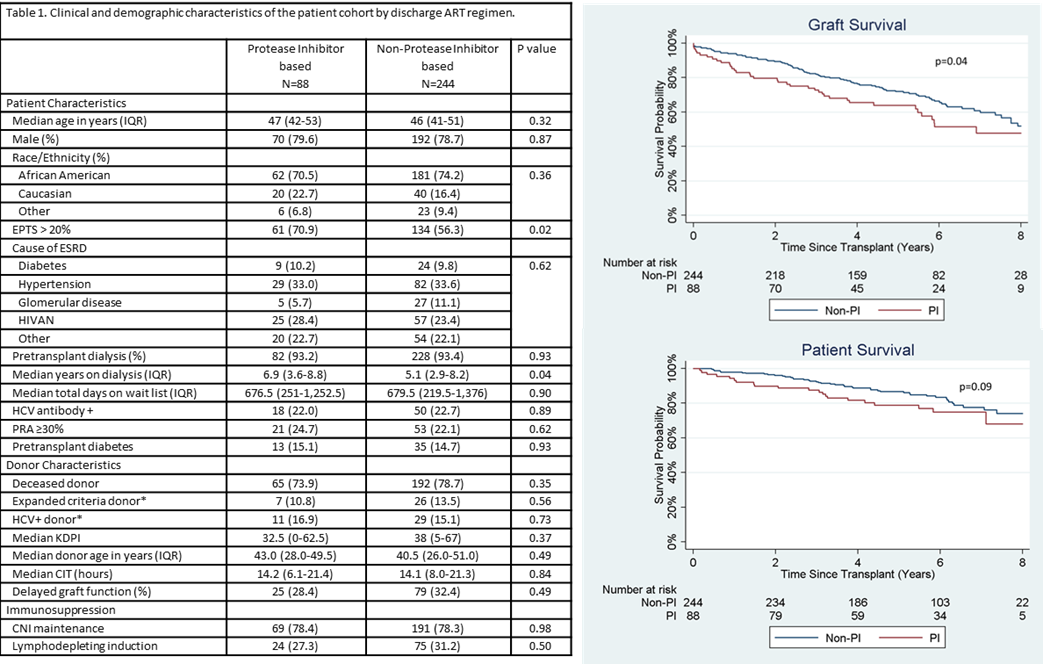Protease Inhibitor-Based Regimens Are Associated with Inferior Outcomes in HIV-Infected Kidney Transplant Recipients.
1University of Alabama at Birmingham, Birmingham
2University of Pennsylvania, Philadelphia
Meeting: 2017 American Transplant Congress
Abstract number: 159
Keywords: Graft failure, Immunosuppression, Mortality
Session Information
Session Name: Concurrent Session: New Insights - HCV / HIV
Session Type: Concurrent Session
Date: Sunday, April 30, 2017
Session Time: 4:30pm-6:00pm
 Presentation Time: 4:30pm-4:42pm
Presentation Time: 4:30pm-4:42pm
Location: E271b
Background: Excellent outcomes have been demonstrated among HIV-infected kidney transplant (KT) recipients when HIV infection is well-controlled. Protease inhibitors (PI) have significant drug-drug interactions with calcinuerin inhibitors, necessitating careful management of immunosuppression. No study to date has explored outcomes among HIV+ KT recipients by antiretroviral (ART) regimen.
Methods: IMS pharmacy fills (1/1/01 – 10/1/12) were linked with SRTR data. 332 recipients with pre- and post-transplant fills were identified. Patients were characterized by ART at time of transplant as receiving PI or non-PI based ART. Graft loss and patient survival were compared across ART regimens using Kaplan-Meier. Models were adjusted for ART regimen, estimated post-transplant survival (EPTS), gender, race, HCV status, PRA, KDPI, induction and maintenance immunosuppression regimens, and transplant era.
Results: Comparing recipients by ART regimen, there were no significant differences in age, race, or HCV status. Recipients on PI-based regimens were significantly more likely to have an EPTS > 20% (70.9% vs. 56.3%, p=0.02) and increased pre-transplant dialysis time (Years: 6.9 vs. 5.1, p=0.04) than those on non-PI regimens. After adjusting for these potential confounders, PI-based regimens were associated with 1.8-fold increased risk of graft loss and 1.9-fold increased risk of death as compared to non-PI regimens (GS aHR: 1.84, 95%CI: 1.22-2.77, p=0.003; PS aHR: 1.91, 95%CI: 1.02-3.59, p=0.05). Conclusions: PI-based regimens were associated with increased risk of graft loss and death. These results suggest recipients should be converted to a non-PI regimen prior to KT.
Conclusions: PI-based regimens were associated with increased risk of graft loss and death. These results suggest recipients should be converted to a non-PI regimen prior to KT.
CITATION INFORMATION: Shelton B, Sawinski D, Reed R, MacLennan P, Mehta S, Locke J. Protease Inhibitor-Based Regimens Are Associated with Inferior Outcomes in HIV-Infected Kidney Transplant Recipients. Am J Transplant. 2017;17 (suppl 3).
To cite this abstract in AMA style:
Shelton B, Sawinski D, Reed R, MacLennan P, Mehta S, Locke J. Protease Inhibitor-Based Regimens Are Associated with Inferior Outcomes in HIV-Infected Kidney Transplant Recipients. [abstract]. Am J Transplant. 2017; 17 (suppl 3). https://atcmeetingabstracts.com/abstract/protease-inhibitor-based-regimens-are-associated-with-inferior-outcomes-in-hiv-infected-kidney-transplant-recipients/. Accessed February 26, 2026.« Back to 2017 American Transplant Congress
